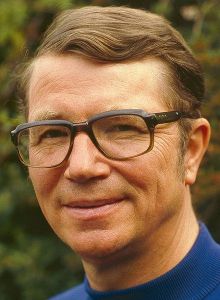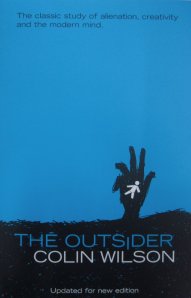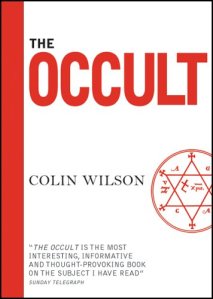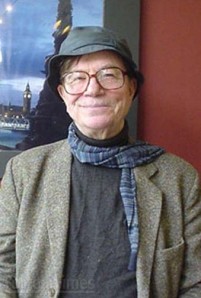Colin Wilson was a prolific author, philosopher and novelist, producing over 120 books on a dizzying range of subjects. This is remarkable in itself, since early in his career, his publisher advised him to quit. Thankfully he possessed an unshakable self-belief, writing on everything from serial killers and crime, to psychology, the paranormal, UFOs, and ancient civilisation. He died on 5th December at the age of 82 after suffering a stroke, and his unfailingly empirical approach to subjects usually classed as flaky will be sadly missed. His books have been enormously influential.
The Rise and Fall of Colin Wilson
 Colin Wilson is probably best known for The Outsider, written when he was 24 and sleeping rough on Hampstead Heath. He wrote the book in the British Library during the day then hunkered down in his sleeping bag under a bush by night. Published in 1956, the book brought overnight fame and claims of genius. He was lumped in with other authors of the same post-war generation called The Angry Young Men, including the likes of Kingsley Amis and John Osborne. Wilson always hated this, pointing out he was a rationalist and an intellectual, whereas Osborne was an emotionalist. Osborne said he wanted people to feel more, but Wilson countered that people feel too much already and don’t in fact think enough.
Colin Wilson is probably best known for The Outsider, written when he was 24 and sleeping rough on Hampstead Heath. He wrote the book in the British Library during the day then hunkered down in his sleeping bag under a bush by night. Published in 1956, the book brought overnight fame and claims of genius. He was lumped in with other authors of the same post-war generation called The Angry Young Men, including the likes of Kingsley Amis and John Osborne. Wilson always hated this, pointing out he was a rationalist and an intellectual, whereas Osborne was an emotionalist. Osborne said he wanted people to feel more, but Wilson countered that people feel too much already and don’t in fact think enough.
The fame and the media furore stoked by critics desperate for something to write about, turned nasty and the backlash began. Perhaps it was because he was working class, left school at 16 and was largely self-taught. Perhaps it was plain old jealousy. Whatever it was, Wilson left London to escape the attacks, shrugging them off with his trademark self-assurance and kept writing.
“When my second book was hatchetted, I shrugged and went on working. The attacks didn’t worry me too much. I know enough of success to know that it is meaningless unless it is based on real understanding. I recognised that such understanding would probably take twenty years to grow.”

Outsider
 The Outsider explores the modern malaise of alienation through the lives and works of artists like Kafka, Camus, Lawrence, Van Gogh, Nietzsche and Dostoevsky. Wilson identified himself as an outsider too, struggling to fit in to a society that seems meaningless: working all hours just to pay the rent and keep running on the treadmill. For what?
The Outsider explores the modern malaise of alienation through the lives and works of artists like Kafka, Camus, Lawrence, Van Gogh, Nietzsche and Dostoevsky. Wilson identified himself as an outsider too, struggling to fit in to a society that seems meaningless: working all hours just to pay the rent and keep running on the treadmill. For what?
“…the day-to-day struggle for intensity that disappears overnight, interrupted by human triviality and endless pettiness.”
The outsider, says Wilson, has a stronger evolutionary impulse. They’re not content to go along with the way things are and seem incapable of being ‘well-adjusted.’ They also seemed to have a very high suicide rate. Not good at coping with reality, they spent too much time brooding, got stuck in their heads, and ended up flaking out.
Wilson was convinced there was another way: we can overcome society’s pessimism by achieving a higher intensity of consciousness.
Absurd Good News
He came to this opinion after almost committing suicide when he was 16. After leaving school, he took a series of mind-numbing jobs which left him in a profoundly depressed state. Convinced life wasn’t worth living, he decided to kill himself. It was a totally rational choice, he says. His future at the time seemed unremittingly bleak.
While working as a lab assistant, he found the perfect solution: hydrocyanic acid. But when he took the stopper from the bottle, he was overcome by a peak experience which caused him to change his mind. In an instant he knew there were two of him: the real him, and the idiot who wanted to kill him. He was lifted into a gloriously optimistic state of mind where he stayed for days. Suddenly everything was fascinating. Life was sweet.
This experience was to influence his entire life’s work.
I had a similar experience when I was 20, recounted in First Contact.
Myopic Dystopia
Wilson realised that his (and our) problem was down to what he called close-upness. A peak experience takes you out of yourself and gives you a bird’s eye view of life, so to speak. It is a taste of your True Self.

Unfortunately, our day-to-day lives are often filled with trivial details and problems that get in the way of this view. We forget, or don’t realise, who we really are. We get distracted by things that don’t matter in the long run. This is close-upness, and the desire to be free of it is what drives Colin Wilson’s work.
Close-upness is caused by what he calls the robot. When we first learn a new skill, like driving a car or playing the piano, we have to think about it and pay attention to what we’re doing. It takes effort and practise, but eventually we get the hang of it. This is when the robot takes over.
The robot is the unconscious and it is essential. If we had to think about everything we did all the time, we would never be free to do more interesting things, like write novels or build rockets to take us to the moon. The trouble is, the robot tends to take over when we don’t need it or want it to. We end up doing things unconsciously, barely aware we’re even functioning. This leads to boredom.
The True Self gets buried by the robot. It filters our view of reality so we can’t see clearly who we are or what is really going on. Everything ends up coloured by the robot’s perspective. A peak experience can jolt us free of this view, giving us a greater sense of meaning and a larger perspective.
“Depend upon it, sir, when a man knows he is to be hanged in a fortnight, it concentrates his mind wonderfully.” – Samuel Johnson
Obviously we can’t go about threatening to kill ourselves all the time in order to relieve the boredom of modern life. But Wilson identified the need for the mental equivalent of constant crisis to keep us alert and stop the robot taking over.
Modern Life is Rubbish
There is something profoundly wrong with modern western philosophy, especially post-modernism. It states that everything is relative and every perspective is valid, effectively flattening all values into meaninglessness. There is no morality and nothing matters. This has given rise to a profoundly pessimistic society with a pernicious misanthropic self-hatred.
Wilson had considerable enmity for Samuel Beckett, the great proponent of this uber-pessimism. As he said, at least T.S. Eliot was genuinely depressed, making The Waste Land’s worldview understandable. But Beckett chose this view. He wanted to say human life was fundamentally meaningless, and achieved great fame and critical acclaim doing so.
“And I will show you something different from either
Your shadow at morning striding behind you
Or your shadow at evening rising to meet you;
I will show you fear in a handful of dust.” – T.S. Eliot
Perhaps this negative view arises from complacency. We don’t need to fight for survival and life is comfortable for most in the West. Without some sort of crisis to wake us up, we get bored. We indulge in endless distractions and create false crises, polarising every argument to the point of absurdity. Our boredom with ourselves and life in general threatens to destroy us.
But there is a fallacy at the heart of post-modernism. Its proponents rarely turn its vivisecting lens upon post-modernism itself. If everything is meaningless, then that statement of meaninglessness is itself meaningless. If everything is relative, then in relation to what?
Post-modernism has demonstrated the logical fallacy at the heart of the rational worldview. Reality is not logical or rational, and to expect it to be so is illogical and irrational. But I digress…
Faculty X
How can we overcome society’s pessimism to achieve a higher intensity of consciousness? Wilson coined the term Faculty X to describe our ability to use our minds to become aware of a larger reality. It is an ability to induce peak experiences.
After reading the Bhagavad Gita, he began to meditate for half an hour every day and found it gave him a great sense of freedom. He saw this as an act of will and concentration, training his mind to stay focused and alert. He recounts a story about trying to drive in treacherous conditions that demonstrates how this works.

He had been staying with friends at a house in the country. Heavy snow made the roads impassable, but he needed to return home. Taking great care, he drove through the snow, concentrating hard so as to avoid ending up in a ditch. He kept this intense focus up for long enough that it transformed his consciousness. He managed to get onto a main road which was clear of snow, but by now his mind was on high alert. Everything around him became fascinating. He had induced a peak experience through concentration.
This is Faculty X. It is also Mindfulness.
With practise, simply paying attention to what is happening can trigger the mind to open and life becomes more meaningful. We can choose how we see reality. Wilson is adamant that we should not waste energy on depression or pessimism. Most of our problems are caused by our own thinking, as related by psychologist Sydney Banks: he complained to a friend that he was feeling depressed, and his friend said something that changed his life:
“You’re not depressed, you just think you are.”
The Occult
 Alongside the philosophy, Colin Wilson also wrote extensively on the occult – that is, areas covering the mysteries of life and death, the supernatural and paranormal, as well as UFOs. These are marginalised areas of interest and often regarded with aggressive cynicism by critics. Indeed, Wilson’s entire output is derided by some as “too daft to be taken seriously.”
Alongside the philosophy, Colin Wilson also wrote extensively on the occult – that is, areas covering the mysteries of life and death, the supernatural and paranormal, as well as UFOs. These are marginalised areas of interest and often regarded with aggressive cynicism by critics. Indeed, Wilson’s entire output is derided by some as “too daft to be taken seriously.”
Personally, I find that attitude itself too daft to take seriously. Those who call themselves sceptics have obviously never read any of the books or considered the evidence.
In fact, when Colin Wilson was asked to write The Occult, he was a sceptic himself. He didn’t want to write the book, but needed the money so took the job. Then he began to study the subject, and the more he looked into it, the more he realised there might be something to it. In time he became convinced of the reality of other types of consciousness that work within the human mind. The evidence for it is overwhelming.
Wilson states that he always remained a scientist at heart and the main thrust of his work was to show people that they possess powers and capacities of which they aren’t fully aware. His books are unfailingly empirical and rational, and he debunks nonsense where he finds it, no matter which side of the debate it appears.
The Future
Gurdjieff, a Russian spiritual guru, said that a human being was someone who had a whole house in which to live, but ended up spending most of their time in the toilet. In his explorations of the human mind and its capacities, Colin Wilson was looking for a way to occupy the whole house.
He says we have powers of mind that are waiting to be awakened, and that the next stage of our evolution will involve just that. It won’t come easily. Raising consciousness to a higher level requires great effort and discipline, but it is possible. In fact, we used to have easier access to a wider consciousness, one that so-called primitive tribes still possess. The occult isn’t really occult at all; it is just the other side of human consciousness – the neglected side.
Wilson’s work was neglected for too long by too many people. Perhaps as the tide turns on human consciousness and we begin to awaken, many more will discover his books and find a way to dream to some greater purpose.

“I am absolutely convinced that the human race is on the point of an evolutionary leap to a higher stage. That at the moment we have, in a sense, reached a nadir of gloom and pessimism, and we’re finding things terribly, intensely difficult. But it is possible for us to actually get out of this, provided enough people realise that Syd Banks is correct. That our problem tends to be a problem we create ourselves through thought. And as soon as we change the thought, then we’ve begun to overcome the problem.”
– Colin Wilson in conversation with Guy Leigh of Astraea Magazine

Oh yeah. And Buddhism itself is profoundly relativistic.
Remember the Kalama Sutta and Indra’s Net?
LikeLike
Exactly.
LikeLike
Yeah, but that doesn’t really say anything.
As Kurt Godel demonstrated, self-referential sets have a tendency to be self-refuting as well. If not they probably imbed circular logic.
So Buddhism, for example, is self-refuting. If everything conditioned is empty, fleeting and a cause of dukkha, then so to is The Dharma.
Biblical Christianity, on the other hand, imbeds circular logic. The Bible is the word of God because it says so in the Bible and that’s the word of God.
You can do one of those things to pretty much every ‘ism’ if you try.
I prefer the self contradicting ones myself. I’m more comfortable with inconsistency and paradox than with inescapable dogma.
Oh, and I reject the tenets of modernism while embracing relativism in most area, so I’m probably a post-modernist. Though I aspire to be a nihilist.
LikeLike
Buddhism is not self-refuting. What a strange idea. I’d agree that Gödel is relevant to its logic, but it rests on a formal axiomatic system of a kind that Gödel does not consider. Unfortunately it’s a huge topic. Let’s just say that dialectic logic is a core part of the Buddhist curriculum for a reason, and it is not because Buddhism can be refuted.
LikeLike
The only way to talk about this and make any kind of sense is through reference to Nagarjuna and four value logic, and if we get into that here, well… we might break the internet.
Superficially, Buddhism appears to undermine its own position, but it’s only a teaching aid, pointing you in the direction of realisation of the true nature of the inherent non-existence of everything, including Buddhism. But that doesn’t mean it doesn’t exist or can be refuted, as you rightly say. It’s impossible to do this justice here. Perhaps I need to write a post…
LikeLike
I’ve heard people describe Nagarjuna’s logic as four-valued before but I must admit that the only understanding of four-value logic I have comes from my IT background and I can’t see that in what little Nagarjuna I’ve read.
What you find a lot in Indian philosophy is rejection of the law of the excluded middle. So to completely exclude the possibility of definition Indian thinkers will often use the formulation “Not A, Not not-A, not A AND not-A, not (neither A NOR not-A)”. While this is helpful when trying draw a line between dialectical logic and non-dualistic concepts it’s not actually four value logic.
Personally I’m a dialectical monist when I’m out and about but when no-one else is looking I’m advaitist.
LikeLike
For anyone interested, there’s a short description of various logics here: http://www.beyondwilber.ca/healing-thinking/both-and-logic.html
I hadn’t come across the Jain 7 value logic before – looks pretty cool..
LikeLike
Thanks for the link.
That’s pretty much what I was talking about in my previous comment. Sattler calls the law of the excluded middle “the law of contradiction” but he means the same thing.
Again, it’s not a true four-value logic system but rather a side-effect of running dialectic logic into non-dualist concepts. It can’t actually be used to define anything – unless you count epistemological boundaries as ‘things’ to be defined.
The Jain one is a three value logic system by virtue of its “indescribable” or “undefined” state, but the extra four are again just an example of dialectical logic sans the law of the excluded middle. I guess it’s a bit like the Scottish legal system with its “guilty”, “not guilty” and “not proven”.
LikeLike
Yes, I am sure that there is more to Buddhist philosophy than cheap logical tricks.
I was merely demonstrating how almost any philosophical or ideological tenet can be reduced to self-refutation or circular logic when applied to itself. I do the same thing to skepticism and non-prejudice in my blog post in response to another blogger who does it to nihilism. My point wasn’t that Buddhism or Biblical Christianity are philosophically bankrupt (or skepticism or non-prejudice for that matter), but that Jessica’s dismissal of post-modernism was lacking in substance.
LikeLike
Maybe I was just being flip and taking a pot shot in passing. The article isn’t really about philosophy, but Colin Wilson, and he wasn’t exactly a fan of post-modernism either.
LikeLike
Yeah, I love to take cheap-shots at “isms” too. Especially my own.
Reflective skepticism is a useful thing to have but you have to be careful not to fool yourself with your own rhetoric. It slips easily into cynicism.
LikeLike
In my view Nagarjuna does not abandon the law of the excluded-middle and uses strict Aristotelian logic for his argument. But he uses it properly, unlike many philosophers. As a far as I know, Buddhism makes no claims that would require a modification of Aristotle’s rules. They just require that we read the rules very carefully.
LikeLike
You are, of course, entitled to any view you like, though you are out of step with the consensus in the field – among both critics and supporters of Indian logic alike.
Even Aristotle himself recognised limitations to the law of the excluded middle, so I suppose in that sense Indian logic is consistent with Aristotle – though not with the three classic Greek laws of logic.
But if you can come up with an explanation of how both A and ~A (not-A) can be false without breaking the law of the excluded middle I am sure that both I and many thousands of logicians worldwide would be interested in hearing it.
Personally I think it entirely appropriate to abandon dialectic logic when attempting to deal with non-dualism. By the time you divide something up into A and ~A for analysis you have destroyed the very non-duality you are attempting to grasp (as indeed you will do by ‘grasping’ or any other subject-object oriented approach).
Sattler’s essay (that Jessica links to) suggests that it is the rule of non-contradiction that Nagarjuna breaches. Perhaps he does that too, but I’ve only ever seen that kind of Indian logic used for negation, so in practical terms it’s the law of excluded middle that is broken. However Sattler, like many Western logicians and the majority of Indian ones, believes that breaking the laws of classical logic is helpful – even necessary – at times. In that I agree with him. If Western metaphysicists did that more often they might find themselves on much firmer epistemological ground.
LikeLike
This is a fascinating topic and one that I can’t really comment on – I’m not a philosopher and have no desire to be one. I don’t want the comments on this post to turn into a forum for debating the ins and outs of logic (mainly cos I don’t know anything about what either cabrogal or Peter are talking about 😉 ), so I may close the comments for this thread. I’ll give it a day just in case Peter wants to add anything in reply…
I would only say that Nagarjuna didn’t see himself as a philosopher and was arguing against Buddhism degenerating into a philosophical discussion (exactly like this thread!). His verses are meant as teaching tools – to point towards the truth which can’t be stated in any positive terms, hence the negation of the negation, etc. Here’s an interesting article for anyone following this discussion: http://www.thezensite.com/ZenEssays/Nagarjuna/zenteachingsofnagarjuna.pdf Definitely something worthy of a longer post at some point in the future…
LikeLike
Thanks for the opportunity Jessica. Don’t worry, the issues are not as complicated as they look. I always feel that Buddhists should be better armed against criticisms of its logic such as crop up here, and this thought is part of the motivation for my blog. .
Cabrogal – There is no suggestion here that A and not-A allows for a third alternative. But the LEM only applies where A/not-A is a well formed contradictory pair as defined by Aristotle. Nagarjuna’s philosophy, Indian philosophy, Buddhist philosophy, does not break the LEM, it denies the legitimacy of what we would normally see as contradictory pairs of propositions,. If Nagarjuna’s proof broke the laws of classical logic it would not work.
For a true contradictory pair of propositions in the dialectic, one half must be true and the other false, or one must be claimed to be true and one false. Nagarjuna proves and claims that they are all false. No problem arises for classical logic. If we are not a Democrat and not a Republican this does not mean we have no political view. It means there is another option.
Yes, I am at odds with many other commentators. My view makes Buddhist philosophy reasonable, while those I oppose make it seem logically ridiculous.
I’m just tidying up a post on this topic which I may put up later today. It will be part of a series on common mistakes that philosophers make. Please come an argue about it if you wish since I am not immune to mistakes on technical issues and am happy to be corrected. But at the moment I am dead certain on this issue, Neither Aristotle nor Nagarjuna was a fool, and they both used logic in just the same way.
Pardon us for getting into logic here, Jessica, It seems boring to many people, but everything depends on it if Buddhist philosophy is ever to make sense in western philosophical terms.
. .
LikeLike
Thanks for clarifying this Peter. No apology needed. I look forward to your new series – I’ll probably learn a few things (well, lots of things!)
Here’s a link to Peter’s blog if anyone needs it: http://theworldknot.wordpress.com
LikeLike
I was very influenced by Colin’s “The Outsider” way back in 1973. I was “well-adjusted to culture, society and people, immersed in a comfort zone, but somehow sensing that it wasn’t authentic. I felt a need to be my own person instead of being other people’s person. His description of the ‘St Neo margin’ helped me to understand that I (and most everyone else) was imprisoned in the world of my (culturally patterned) mind. This understanding led me to a spiritual path which has, and continues to, radically transform my whole life, both inwardly and outwardly. Thank you Colin. And thank you Jessica for honoring him.
LikeLike
Thanks Rob, I’m glad you enjoyed it. Colin Wilson’s books had a big influence on my thinking too. I started with The Occult, then discovered The Outsider later. Writing this tribute made me want to re-read all his books again.
LikeLike
A great writer and a very nice tribute. Thanks J.
LikeLike
Thanks Peter.
I posted this a while back but as a page. I’m rejigging my site at the moment so decided to repost it as a post. It’s a bit out of date, but Colin Wilson’s books are always worth promoting.
LikeLike